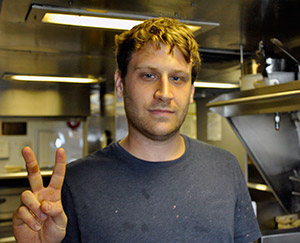Brendon Todd, Cook
 Brendon Todd, Cook
Brendon Todd, CookHow did you get into cooking in the first place?
I just kind of fell into it. My first job was washing dishes, my second job was at a pizza joint, and after that, I was a manager at that restaurant, at the back of the house. I worked an office job in between, and I just did not enjoy it. It’s a totally different environment in a kitchen, when you’re all working for a common goal. If you have a team of people that are engaged enough and focused enough, it’s an awesome environment. It keeps you sharp, keeps you challenged, and then 10 hours later, the day is done, and you have no idea where it went—and you have a paycheck in your hand.
How do you pick out what the menu will be?
It’s kind of a fun challenge. You’re dealing with vendors, and have to calculate what you’ll need over the next few weeks or months at sea. You get to pick out whatever you want, so I get to order nice smoked salmon and good sustainable fish, and I get to use it for the next couple of months. From there, you decide what you’re going to make. You have to ration and try to look ahead. Some stuff we get in bulk, and it lasts for months—like frozen meat, chicken, dry goods, chips, soda, baking supplies, those sorts of things. We usually only get fresh fish and produce in smaller amounts, since we’re not often out at sea for more than a month at a time. We do stock up with a lot at a time, though. Before leaving San Diego for this cruise, we loaded twenty forklift pallets of food.
Where do you go shopping for that much food?
We work with big suppliers for most of our stuff, but I’m proud to say that back at Woods Hole, we have a local vendor with its own farms in New England, and they do a great job. They supply all of WHOI’s ships now. When we’re coming into different ports, I like to work with local suppliers to get sustainable food wherever I can—not the individually-wrapped stuff that has been shipped from halfway across the world. We find people with good reputations in different cities that become our go-to people. It’d be cool if we had a garden out on the stern as well, though, or maybe some chickens and goats. [Laughs]
Speaking of which, here’s a little sailor’s tale. A lot of sailors have tattoos of pigs and chickens. That’s because back when ships used to carry live animals for food, they’d keep them in wooden crates below decks. If the ship sank or something happened to it, those wooden crates would always float. So pigs and chickens are good luck, because sailors could swim over and grab a hold of them, and get rescued that way. So the story goes that if you have pigs and chickens tattooed on yourself, you’ll float.
Do you have any tattoos like that?
No, but I’m pretty sure at least one other person on board does.
So how do you keep food fresh for so long? We’re three weeks out of port right now, but we’re still eating salads.
Well, our main refrigerators have O3 (ozone) pumped into them. I can’t tell you what that does scientifically, but it definitely helps keep things fresh for long periods of time. We also try to use up the stuff that will go bad first. For instance, if we’re at sea for three weeks, we wouldn’t order three weeks of fresh basil, because the leaves are pretty delicate and they just wouldn’t last that long. It’ll be gone in a week, so it’s a nice treat while it lasts. But things like squashes or root vegetables like potatoes or onions will last a month.
Think you’ll stick with cooking at sea?
I’m originally from Rhode Island, so what I really want to do is open a restaurant there. I think I could kill the competition. In the past six years as cook here, I’ve been able to try a lot of new techniques, but the constraints of getting stuff out for 60 people at once are that I can’t plate the food, or garnish, or try new techniques that contemporary chefs are doing. I’d like to do that. Ideally, I’d work with small farms to do a modern American fare. Working with local suppliers is the way of the future as far as restaurants go, and I want to be a part of that.
Got a name picked out?
My favorite so far is “North Shore Eatery” or “North Shore Kitchen,” something like that. When I was a kid, my family would go to Hawaii, and the north shore of Oahu was always a special place for me. Hawaiian food is awesome, too—stellar seafood, in giant, fresh, hearty mounds. It’s one of my favorite cuisines.
What do you like best about cooking for other people?
The last hour before dinner is the best time of my day. Things are getting finished, the timing is there, the execution, and everything comes together in the last five minutes before the meal. I love that rush. It’s a challenge, and it’s what I enjoy doing. It’s like any trade-based job—if you’re into it, all you want to do is get better at it. And that’s what keeps me going.
[Back
to top]
|

